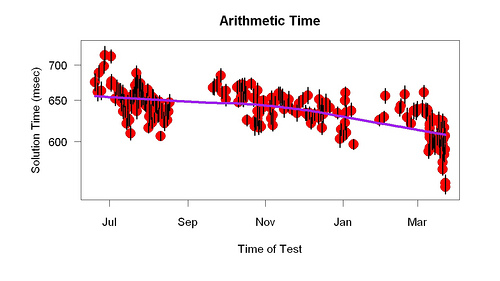From Joyce Cohen’s The Hunt column:
For reasons unknown, Florida didn’t agree with little Noah Tovar. Since his toddler years, Noah, now 7, had suffered terribly from asthma. His parents, Jari and Selene Tovar, moved their family several times, trying to escape the mold or pollen or whatever it was that caused his breathing problems. Nothing helped much.
Noah’s parents didn’t know, I can tell, about a 1992 study of childhood asthma and allergies in Germany. Maybe childhood asthma is caused by air pollution, the researchers thought. Let’s test that idea by comparing a clean West German city (Munich) with a dirty East German one (Leipzig). Here’s one of the results:
The lifetime prevalence of asthma diagnosed by a doctor was 7.3% (72) in Leipzig and 9.3% (435) in Munich.
Less asthma in the dirty city! It wasn’t a significant difference but similar differences, such as hay fever and rhinitis (runny nose), were in the same direction and significant. Hay fever was much rarer in Leipzig.
Noah’s asthma cleared up, to his parents’ surprise, on a trip to New York. So the family moved to New York.
Even though “everyone was under the impression that New York would cause him more distress, it was just the opposite,” Mrs. Tovar said. “Not one doctor nor myself can explain what it is.”
Mrs. Tovar’s doctors are badly out of date. The hygiene hypothesis has been around since the 1990s, supported by plenty of data that, like the German study, shows that childhood allergies are better in dirtier environments. Noah is better in New York because New York air is dirtier than Florida air — that’s the obvious explanation.
In The Probiotic Revolution (2007) by Gary Huffnagle with Sarah Wernick, which I’ve mentioned earlier, Dr. Huffnagle, a professor of immunology at the University of Michigan, describes a self-experiment he did:
Could probiotics relieve something as tenacious as my lifelong allergies and asthma? I decided to take a probiotic supplement and make a few simple changes to my diet to my diet, just to see what happened. Yogurt became my new breakfast and my new bedtime snack. I also upped my intake of fruits and vegetables. Whenever possible, I substituted whole grains for processed ones. And I tried to cut back on sugar. [Why he made the non-probiotic changes is not explained. In another part of the book he says he also increased his spice intake.] No big deal.
Because I doubted this little experiment would work, I didn’t mention it to anyone, not even my wife. And I didn’t bother to record my allergy symptoms. . . My “aha” moment came after about a month: I’d spent the evening writing a grant proposal, a box of tissues at my side. After all these years, I knew to be prepared for the inevitable sneezing and runny nose caused by my mold allergies, which kicked up at night. But when I finished working and cleared the table, I realized I hadn’t touched the tissues. And as I looked back on the previous month, I could see other changes. This wasn’t my first sneeze-free evening; I hadn’t needed my asthma inhaler for several months. To my astonishment, the experiment had been a great success.
This is a great and helpful story. Only after I read it did I realize I’d had a similar experience. I’ve never had serious allergies but I used to sneeze now and then in my apartment and my nose would run a lot; I went through more than one box of Kleenex in a month. Maybe 4 in one morning. In January, I made just one change: I started to eat lots more fermented foods (yogurt, kimchi, kefir, etc.). My sneezing and Kleenex use are now almost zero.
The Tovars can live wherever they want, I’m sure, if they feed their son plenty of fermented food.
Previous post about childhood allergies and fermented food.
More After the column appeared, someone wrote to the Tovars:
Funny, same thing happened to me. I moved from England where I had chronic asthma, to New York City where I had none. Stayed in NY for twenty years asthma free, then moved back to England with my wife for the last ten years and my asthma has returned all the time I’ve been back.

